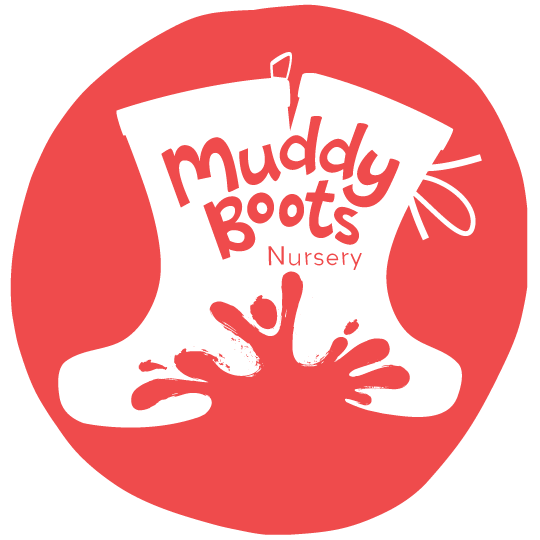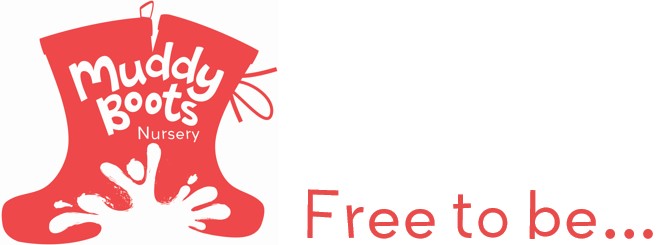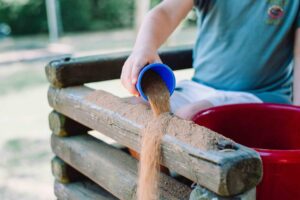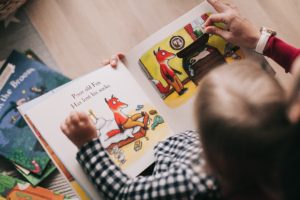It’s easy to think that learning to write starts when children begin forming letters, often when learning to write their name. It actually starts way earlier in their development, developing the skills needed to start writing from a very young age. At Muddy Boots, the journey begins in our baby rooms.
In this blog, you will discover some of the things we do at nursery every day to develop those all-important skills, all of which can be done at home without fancy resources.
Gross Motor Skills
Before starting to write, children need good upper body strength, hand-eye coordination and the ability to ‘cross the midline’ (reaching for something on their left with their right arm), which are all examples of gross motor skills.
All of these skills need to be developed so children can be successful when they come to start to write. Some of the ways we help support that development (and you can at home):
Dance and movement
Dancing encourages lots of big arm movements, which helps build up strength and coordination. We love to use ribbons to develop this further, and the children love to see what patterns they can make in the air with the ribbons. Some of the older children even enjoy trying to make letters with them.
Sand play
Playing in big trays of sand, filling and emptying containers, moving the sand around and making marks are all great ways to build upper body strength for children – as well as a great excuse for a trip to the seaside!!
Big mark making
We provide lots of opportunities for big mark-making, including using chunky chalks on big chalkboards and enormous sheets of paper on the floor to draw and paint on.
Digging
Digging is fantastic for building upper body strength, so we provide lots of digging opportunities for the children at our nurseries using a range of resources and activities.
Throwing and catching
Starting with the younger children rolling the ball to each other, and working up to using a range of balls to throw and catch – it all develops the essential hand-eye coordination needed to learn to write.
Fine Motor Skills
Hand and finger strength, manipulating objects and starting to develop a three-finger pincer grip are some examples of the fine motor skills needed to develop for early writing. Here are some of the activities and resources we use to help the development of fine motor skills.
Tweezers
Adding tweezers and small objects to various areas in our rooms encourages children to develop strength in their hands. This might include them being used in the home corner while making yummy meals or using them to pick up ingredients for potions!
Tools
We encourage children to use a range of tools throughout our nurseries, all of which build up their strength and develop hand-eye coordination.
Fingerprinting
We love to get stuck in and get messy at Muddy Boots, and finger/hand painting is one of our favourite ways. We provide lots of resources and opportunities for children to get creative with their hands using paints, gloop and mud.
Mark Making
Similarly to gross motor skills, providing children with a range of ways to mark make with their hands is a great way to build fine motor skills, all whilst starting to make marks and assign meaning to them (e.g. “look a cat”).
We provide a range of materials for this, such as sand, flour and gloop which provide open-ended opportunities for children to be creative.
Dough Disco
We absolutely love Dough Disco’s at Muddy Boots! You can find some good examples of this on YouTube if you want to try it at home – think of it as playdough, meets disco, meets BopIt!.
We put on some good cheesy music, each child gets given a ball of playdough and we do different ‘moves’ to the playdough along to the music e.g. ‘squish it’, ‘pat it’, ‘poke it’. It’s a great, and super fun way to build up those all-important muscles in those little hands.
Threading
Threading is a great, and simple activity for building strength and developing hand-eye coordination. There are lots of threading sets you can buy, but a piece of string or wool, a piece of card and a hole punch can create something just as good.
Language rich environments
For children to start to write, they need examples of what this would look like and a good vocabulary. This can come in a range of ways, none more so than in language-rich (both written and spoken) environments.
Books
We adore books in all rooms at Muddy Boots. We share them in big groups, small groups, one to one and allow children to access them independently. We make sure they cover a range of topics and interests so that every child will find a book that they love.
Reading books with children is important for their learning of language and expanding their vocabulary, as well as providing an opportunity for them to start to see language written down – all of which is a good starting point for when they are ready to start recognising and forming letters.
Lots of language relevant to children
A language-rich environment also features examples of language that is relevant and important to them, such as packaging in the home corner, road/safety signs in construction zones, or name labels for signing in.
Communication-friendly spaces
Although nursery rooms can often get quite busy and noisy – we ensure that we offer quiet spaces away from the hustle and bustle. This includes quiet spaces, little dens, or a little corner of the garden. These areas are often where we hear children talking more, experimenting with language, and building relationships with their peers.
Songs and rhymes
You won’t be in a room at nursery long before someone bursts into song! It’s not just because it’s great fun, it’s another great way of developing language in a playful way.
Mark-making opportunities (linked to interests and with a purpose)
We think it’s really important to provide a wide range of mark-making opportunities for children because we never want writing to seem like a chore, so we ensure there are mark-making opportunities in all areas of our rooms that link to children’s interests. We do this by:
- Offering a range of materials to use to make marks with and on.
- Linking mark-making with children’s interests, such as drawing plans for a building they are making in the construction area, checking off things they’ve found on a nature hunt, and drawing a self-portrait.
- Our team will often add mark-making opportunities to extend learning, but we also make sure there are plenty of tools available around the room for children to access independently as well.
- Adults modeling mark making and sharing examples.
That’s all for now! Hopefully, you can see all the work that goes in throughout your child’s whole nursery journey to get them ready to start writing. It’s so important that all these skills are developed first, so that when it comes to starting to form letters and write words, we are setting children up for success and ensuring they are fully ready for this next stage.
There will be another blog coming up soon where we will go into more detail on that next stage – Early Writing itself, exploring how this develops and what we do to support it in our pre-school rooms.




